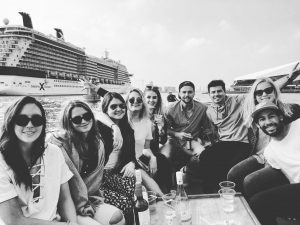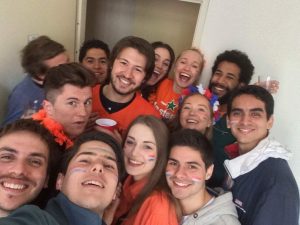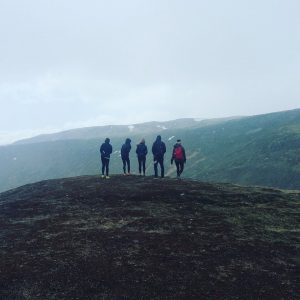Pre-Departure:
I think that the most valuable advice that I can give you for the period before you leave is to try and complete all the admin which comes your way as quickly as possible. Both the University of Amsterdam (UvA) as well as Stellenbosch provide clear guidelines and deadlines which allow the process to run as smoothly as possible. STICK TO THE GUIDELINES AND SUGGESTIONS!!!! Applying for the necessary visa for your stay is fairly straight forward and the international office at UvA provide clear instructions on how to do this. Fortunately for students who do exchange at UvA, the university works directly with the Dutch Immigration office. This means that the time that you have to spend in an embassy is cut down to just over 10 minutes over two separate visits around a week apart.
When it comes to choosing housing UvA provides a number of different options that are organized through various private housing providers. Whilst you may not be able to directly choose your housing from the onset, you will be able to choose your preferences in terms of whether or not you are willing to have a roommate, and/or if you are willing to make use of shared facilities such as bathrooms and kitchens. Once your application has been processed the private company which you have been allocated to will then send you a number of options. MAKE A DECISION QUICKLY!!!! There are a number of international students who are looking for cheap, but nice housing so make the decision and first payment as quickly as possible so as not to be disappointed.
When deciding on housing make sure to have Google Maps open with you. With Amsterdam being a relatively small city you may expect that all of the housing options will be close enough to key things such as shops, cafes, museums and campus. Without looking at a map I chose a location that was slightly further out than a number of my (new) friends. Whilst the actual housing was great there became times when the 25-30 minute cycle to class or from a bar late at night in the rain was less than ideal. There are a number of campus buildings spread out over the city. Based on your classes you should be able to see where the faculty and even your classes are situated before making a housing decision. Below are three options I would recommend depending on your preferences:
- Prinshendrikade: Roommate (sometimes in separate rooms), and shared facilities with roommate. Very central. 5 minute cycle to the main business/economics campus. 0-5 minutes to a number of bars and cafes. 10 minute cycle to the museum district
- Sarphatistraat: Shared room. Here the rooms are pretty small and you have to be fairly open-minded on the type of roommate you might get. The location is on the main campus with shops and cafes on its doorstep. Central to most activities that you will get up to. Mixed experiences for my friends who have stayed there.
- Rode Kruislaan (Diemen): 25 minutes from campus. Other than the distance the housing is great and you will be surrounded by enough international, as well as Dutch students to make friends and stay busy. Single rooms with own bathrooms.
Experience at Host University:
Like most universities across the globe UvA has an international student network (ISN). I would highly recommend that you sign up for this network as soon as the opportunity presents itself during the application process. ISN provides you with an introductory week where you are able to meet most of the people who will become your friends and family in Amsterdam. They organize a number of cool events and tours throughout the city in the introductory week as well a number of tours (London, Berlin, Prague), parties and other activities in and around Amsterdam throughout the semester. It is the quickest way to make friends and to find an event when you are feeling too lazy to organize something yourself.
UvA as an institution is truly world class. As an Economics Masters student I felt that the classes were interesting and challenging, whilst also not being impossible. I found that a number of the classes were at the same level as back home whilst one or two stretched my ability for the better. Whilst the standard is not too different to back home there is definitely a difference in the set-up of the classes as well as the manner in which the lecturers teach. As you will find out during application the semester is split up into three blocs. In each bloc you may choose certain subjects that run for 6 weeks. Once you have had these 6 weeks of lectures you have a final exam or paper (which often counts for almost the entire grade), which sees you write off this work. At the start of the second block (the next 6 weeks) you start entirely new classes. My advice would be to do as many classes as you can in the first bloc whilst leaving one for the second bloc. I had all my classes in the first bloc, due mainly to the fact that I am a Masters student and the last two blocs are given as a time to focus on thesis work, and whilst this meant that I was finished with academic work by March 28th (which was great) it also meant that I had almost too much time on my hand whilst my other friends had work to do.
Whilst in Amsterdam I advise you to do as much as you can on a daily basis. This city is possibly one of the most culturally rich cities in the world and you can learn a lot in the world famous museums around the city as well as meet a number of interesting people from around the world in the 100s of small cafes. Making Dutch friends is not the easiest thing to do, but I would encourage you to try and do this as they are able to give you a lot of great tips on what to do and see in their country.

In order to make the exchange experience even better I encourage you to travel as much as possible. This does not mean ignoring your work, but rather planning trips (whether it be for a weekend, week or longer) in between the breaks which you will get throughout the semester. Whilst the traditional great cities such as Paris, Rome, and London are all easily accessible and have an obvious attraction I suggest that you travel to places which you may not have thought of before. Places such as Prague, Budapest and Bucharest have nearly as much to offer as the traditional destinations and often at a fraction of the price. Often the beauty from these places stems from the fact that they have yet to be ruined by too many tourists. I was fortunate enough to do a trip to Iceland with some of my new Amsterdam family and I can truly say that it was a life changing experience. There is undoubtedly no country on this planet which has a better collection of natural beauty. If you get the opportunity to do it then put it on the top of your travel list. Be flexible in how you wish to travel. Whilst taking a bus to Berlin may have taken me over 10 hours it allowed me to see some of the landscapes whilst saving 50 euros. It is also easy to find bus return tickets to Belgium for 2-5 euros if you have a free weekend and want to get out of Amsterdam.

Whilst travelling is important remember that Amsterdam will be your new home and it is important to immerse yourself in events happening in and around the city. There are number of festivals, markets, national celebrations and parties in which people from all over the world are made to feel welcome. DO NOT MISS KINGSDAY (27 April), which is the biggest celebration of the year. Everyone gets dressed in orange for the biggest birthday party of the year as thousands of people walk the streets to celebrate with each other.
Return to South Africa:
The last few weeks of exchange are ones that are filled with a mixture of emotions. There is a lot of sadness knowing that I am leaving behind possibly one of the best experiences of my life. The six months of exchange go by in a flash. I think that the worst part of leaving is maybe not the fact that I am leaving Amsterdam and returning home, but rather leaving or saying goodbye to the various friends that I have made from around the world. It is extremely difficult if you realistically think to yourself that some of these faces you may not ever see again due to the large distances which separate our home countries. What is comforting though is that you know you have made friends for a lifetime, friends who you can count on and call up if you ever find yourself in their neck of the woods.
There is of course some happiness that fills me with regards to my return back home. I look forward to seeing my friends and family and sharing some of my stories and adventures to the point where they eventually become bored and sick of hearing them. There are obviously certain comforts of home that are just not possible when on exchange, and these comforts I look forward to. As I am at the end of my studies (minus a thesis hand in) I return home with the daunting task of finding myself a job in the competitive South African labour market. The semester exchange has however provided a sense of confidence in this regard as it has, I feel, allowed myself to learn a number of valuable skills, which should be of good standing moving forward.
Although sitting on another continent it can be easy to pick out a lot of the negative things about South Africa that get portrayed in the media I look forward to embracing the diversity and uniqueness of our country on my return. It is important as a well educated individual on exchange not to be unnecessarily disheartened by some of the news that you hear about relating to South Africa. You should remain realistic when hearing about the standards which your new friends talk about when telling you about their homes and at the same time not become one of those old South Africans who wag their finger at ‘poor’ South Africa from a distance. Many people from abroad have so many questions and fascinations with South Africa and I feel this has lit a positive spark in myself as a young South African. Exchange has been the best six months of my life, and it will stay with me forever through the friends and memories I have made.


